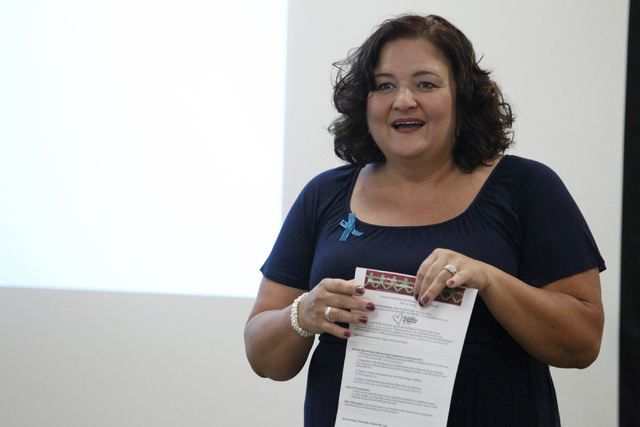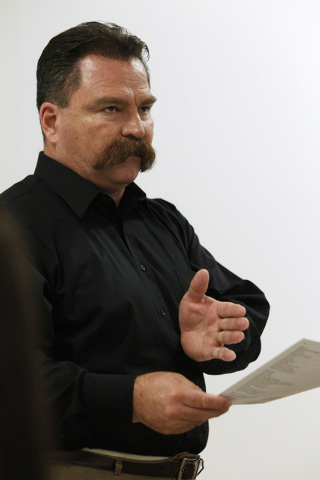Sex trafficking sign plan questioned
A Las Vegas pastor’s idea to report to police suspicious businesses who decline to display a human trafficking hotline poster is being met with skepticism by business and civil liberties leaders.
The new human trafficking awareness effort is being suggested by Pastor Troy Martinez, of the East Vegas Christian Center as part of his involvement with a working group of Las Vegas Mayor Carolyn Goodman’s Faith Initiative focused on addressing human trafficking.
Martinez presented a hypothetical scenario of his plan, which is in its infancy, at a meeting Thursday.
Picture this: A few trained volunteers go to a Las Vegas bar and ask the owner to put up a poster with the national human trafficking hotline.
The owner agrees and a volunteer notes it on a form before moving to another business, a nail salon, perhaps.
The salon owner doesn’t want to hang the poster, and someone makes note of it on a form. Maybe volunteers observe a lot of single men hanging around the establishment and decide that is suspicious, so someone writes that down, too. Then, those notes might get passed on to law enforcement.
The scenario drew suggestions from those attending Thursday’s working group meeting that the bar seemed forthright, but the nail salon was a different story.
“Well they’ve got something to hide. They don’t want the poster. They don’t want to cooperate,” one member said.
The idea of citizens informing on local businesses who rejected displaying a poster bewildered Tod Story, executive director of the American Civil Liberties Union of Nevada.
Story said it sounded like the “If You See Something, Say Something” campaign on steroids.
“While we are opposed to human trafficking it is improper for volunteers or nongovernmental actors to be out policing business owners and reporting their findings to Metro when the business owners are just expressing their First Amendment rights,” Story said. “No business owner should be forced to participate in a program, regardless of the reason that they choose not to participate.”
Martinez’s idea is modeled after a Los Angeles law that requires establishments — including adult or sexually oriented businesses, massage or bodywork services, emergency rooms and bars — to post the national human trafficking hotline.
The law went into effect in April 2013 and was followed by a grassroots effort to distribute the required posters to businesses as well as help educate owners about the new requirement. As part of the project, volunteers filled out a questionnaire noting if the owner was in compliance, aware of the law and if the owner agreed to hang the poster.
According to Martinez, the community began to identify which businesses were legitimate and which businesses were being used as fronts for human trafficking or sex trafficking.
At the Thursday meeting, Martinez explained that the survey was one of the most effective parts of the poster initiative. “There (were) a lot of people who benefited, and there were actually some who were rescued because of the reporting system,” he said.
Martinez told the Review-Journal after the meeting that the project is in the early stages and that he might ask the business community for input. He noted that discussions at working group meetings involve a lot of brainstorming.
Martinez’s conclusions, however, don’t match what actually has happened in Los Angeles, according to a leader of the grassroots campaign, Maya Paley, director of legislative and community engagement for the National Council of Jewish Women, Los Angeles section.
Paley, who has met with Martinez about the Los Angeles effort, said while the potential is there for volunteers to stumble on a human trafficking front and report it, that has yet to happen. Also, no one has been rescued as a result of the poster outreach survey, though the potential is there, she said. The questionnaire exists so clear data can be collected on how effective the outreach is, Paley said. She added that survivors have said the posters would have helped them tremendously.
When asked Friday about the discrepancy between what he told the working group and the results described by Paley, Martinez said that was the impression he was given by other people.
He then said he didn’t remember saying that the surveys gave those results.
“Well it’s as accurate as I got in two days from the groups that I talked to, and we’re going to look into (the idea),” Martinez said, noting that at the meeting he had to condense days of training into a 10-minute briefing.
Meanwhile, authorities and business leaders said Martinez’s idea will need some vetting.
Lou Pascoe, director of the Southern Nevada Human Trafficking Task Force, said it is too premature to know if the poster project is an idea that would translate to Las Vegas. For it to work, businesses would have to be involved and it would have to be reviewed by Metro, she said.
Lt. Karen Hughes, who oversees the Las Vegas Metropolitan Police Department’s vice section, said she would want to see an analysis of how it worked elsewhere and what resources, if any, it would require from Metro. Hughes echoed the sentiment that for a voluntary poster campaign to work, business support would be essential. As of right now, there are too many variables to decide if the poster project is something Las Vegas should undertake, she said.
The Las Vegas Metro Chamber of Commerce agrees that businesses should be brought in on these discussions, said spokeswoman Cara Clarke.
“This type of program would need to be done in the safest way possible. You wouldn’t want to create a situation where the victim that is being trafficked is more victimized, or the volunteer puts themselves in harm’s way, or a business owner that is completely innocent is perceived as being guilty,” Clarke said.
“There’s a myriad of reasons that a business may not want to put up signage or may not seem responsive to a volunteer talking to them,” she said.
Human trafficking is an important issue that should be addressed, and it’s vital that experts, such as Metro, have oversight, Clarke said.
Paley said she has noticed businesses, many of which haven’t heard of the new California requirement, tend to respond once the law is explained.
“I think it will be a harder campaign to sell if you are saying, ‘Would you do this as a good Samaritan?’ ” Paley said. “A lot of places, I think, if it wasn’t a law they would say, ‘Well why would I put it up here? This is not a human trafficking establishment.’ ”
Legislation requiring a trafficking hotline to be posted isn’t unique to California.
There are 22 states with laws providing for the posting of information about trafficking hotlines, according to a 2013 analysis of state human trafficking laws by the Polaris Project, a nonprofit organization aimed at fighting human trafficking.
Mandating a hotline be posted increases call volume and tips about trafficking, according to the report.
Contact Bethany Barnes at bbarnes@reviewjournal.com or 702-477-3861. Find her on Twitter: @betsbarnes.





























